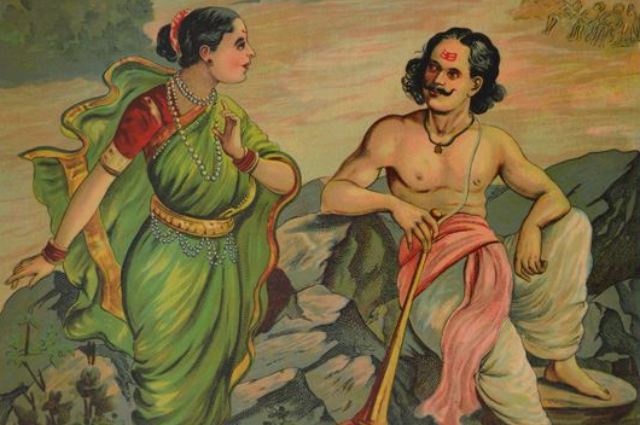Deep in the forests of ancient India, a young, brave demoness lived with her brother. In the complex world of the Mahabharata, where everything was about one’s duty, traditions, and rigid social hierarchies, a demoness fell in love with a human prince and left everything that she had, breaking all the norms of the society for the sake of love.
This story begins in the forests of ancient India, where the Pandava brothers sought refuge. Among the five brothers was one fierce warrior known for his unmatched strength and loyalty. Around this very area lived a rakshasi or demoness called Hidimba, who belonged to a tribe that preyed on humans.
Hidimba and her brother lived in the middle of dense forests, terrorising humans. This demon brother and sister showed no mercy to humans, except one. In the middle of the forests, the rustling of leaves and the crackling of fire were the exiled Pandavas. Watching them from a distance keenly was Hidimba, the Rakshasi. Her brother had sent Hidimba to kill them all, but then she saw him.
She saw Bhima, the second Pandava, resting. Hidimba had arrived with a motive, which was to kill them, but when she looked at Bhima, something changed in her.
A branch snapped, and Bhima woke up suddenly. Bhima looked at him, and she froze completely, forgetting her purpose, what she came for.
And then Hidimba said something no rakshasi would have said ever, she said she wanted to marry him. Bhima disagreed with the proposal, calling her a human-eating demoness. Hidimba continues to persist, praising him and even proposing a temporary marriage until a son is born.
Hidimb, the rakshasi’s brother, comes into the scene suddenly and tries to attack Bhima. Bhima tried to defend himself, and in this process, Hidimb gets killed. Only when Hidimb attacks Bhima then he get to know of Hidimba’s original motive.
After the episode, Hidimba pleads to Kunti, the mother of the Pandavas, “Please let me marry your son. I will return you to him after bearing a child”. Bhima refuses the offer, calling this union against the dharma. Yudhishtra argues that rejecting Hidimba, after killing her brother, would be an act against the dharma. It was only after Kunti’s intervention that the marriage took place.
The union of Hidimba and Bhima lasted for a year until the birth of their son, Ghatotkacha. Once Ghatotkacha was born, Hidimba kept her promise and left with his son.
As a rakshasi, it was the duty of Hidimba to kill the Pandavas, but after seeing Bhima, she transformed from a bloodthirsty demoness to a woman in love, willing to sacrifice anything for it. Her transformation is very different from the other characters of Mahabharata because it was not through curses or divine intervention like the other characters, but it was through her own choice.
Even though her love was not met with open arms, she pursued her love. She pleased for love, not as a demoness but as a woman who had forsaken everything for a single chance of belonging. Her love for Bhima was not born out of lust, hunger, money, or power- it was fierce, tender, and unconditional. Her love was so fierce that she did not hesitate to defy the norms of the society.
Hidimba’s love was not just fierce or passionate, but it was also tender. She accepted the conditions set by Kunti, even though she knew that their union would be very brief, but instead of holding any resentment in her heart, she gave everything and devoted herself fully into the union, making the most out of their marriage rather than lamenting at its impermanence.
Her love, unlike many characters from the tale of Mahabharata was unconditional. She loved Bhima not because she wanted money or power or gain of any sort; she loved him just because she did. Her love did not demand any reciprocation; it was complete with or without it.
Unlike many of the characters that lamented their fate, Hidimba showcased maturity by letting go of Bhima when the time came. She poured in all the love and care in nurturing her son, Ghatotkacha, not with the resentment of the absence of a father but rather with utmost care and responsibility.
Ghatotkacha ultimately became a strong warrior who followed the path of righteousness like his parents. He sacrificed his life in the historic battle, where he tried to counter Karna’s divine weapon, saved Arjuna, which ended up changing the entire course of the war. This sense of selflessness came from his mother, where he sacrificed life for his duty towards his parents.
This goes on to show how Hidimba beautifully raised her son, not with resentment but rather with love and instilling noble values in her child.
Hidimba’s story is often reduced to a demoness who fell in love with a warrior, but I think she was nothing short of a hero herself. She was a woman who showcased great resilience and strength, and while she might not be known like the other characters from the epic, she is a legendary woman worthy of our respect and admiration. She should be remembered not because of her love towards Bhima, but because she was a strong woman who kept her word, because she showcased immense resilience. After all, she raised a warrior son who followed the dharma in his way, just like his mother.

